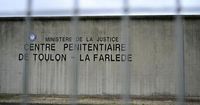In a shocking series of coordinated attacks, multiple prisons across France were targeted overnight, leading to a significant escalation in tensions surrounding the country's ongoing battle against drug trafficking. The incidents, which occurred on April 15, 2025, involved arson and gunfire, prompting an immediate investigation by France’s national antiterrorism prosecutor’s office.
Justice Minister Gérald Darmanin confirmed that the attacks were linked to the government's intensified crackdown on drug-related crime, particularly in light of record cocaine seizures from South America. He stated, "Attempts have been made to intimidate staff in several prisons, ranging from burning vehicles to firing automatic weapons." This statement underscores the serious nature of the threats faced by prison facilities amid rising drug violence.
The attacks unfolded at several locations, including the Toulon-La Farlède prison in southern France, which was struck by heavy gunfire from what officials described as military-grade weapons. At least 15 bullet impacts were found on the prison's entrance, according to the prison staff union UFAP. In Villepinte and Nanterre, both located near Paris, vehicles belonging to prison staff were set ablaze, with security camera footage capturing the moments of the arson.
In total, seven prison facilities were targeted in the attacks, which also included incidents in Aix-En-Provence, Marseille, Valence, and Nîmes. The coordinated nature of the assaults has led authorities to believe that they were organized, potentially by drug traffickers seeking to retaliate against the government's anti-drug strategies. Darmanin noted, "The French Republic is facing up to the problem of drug trafficking and is taking measures that will massively disrupt the criminal networks." He is set to visit the affected facilities to support the officers involved.
Interior Minister Bruno Retailleau echoed Darmanin's sentiments, emphasizing the need for a relentless response to such attacks. He stated, "Those who attack prisons and officers deserve to be locked up in those prisons and monitored by those officers." Retailleau has instructed local authorities to enhance security measures at all prison facilities across the country.
The prison guard union, FO Justice, expressed its outrage and concern over the attacks, labeling them as a "frontal attack" against the institution and the state. They called for urgent government action to protect prison staff, who are increasingly facing threats in their line of duty. In a statement, the union said, "These criminal acts are a full-on attack on our institution, on the republic and the staff who serve it every day."
Adding to the alarm, a prison officer was reportedly threatened at their home in Nancy, while an attempted arson attack occurred in Marseille. These incidents highlight the growing risks faced by those working in the prison system, as drug-related violence spills over into everyday life.
The attacks come on the heels of unprecedented cocaine seizures in France, with authorities reporting 47 tons confiscated in the first 11 months of 2024, a stark increase from 23 tons in the entire previous year. Retailleau described this surge as a "white tsunami" that has rewritten the rules of the criminal landscape within the country.
In response to the escalating violence, the French government is reviewing legislation aimed at enhancing its fight against drug trafficking. Proposed measures include establishing a National Prosecutor's Office for Organized Crime, which would provide law enforcement with greater powers to tackle narcotics-related offenses. Additionally, Darmanin has suggested building new high-security prisons to isolate the country’s top 100 drug traffickers, reflecting a commitment to addressing the root causes of the violence.
While no group has officially claimed responsibility for the attacks, the letters "DDPF," which stand for "French prisoners' rights," were found inscribed on damaged vehicles at several sites. This has led to speculation about the potential involvement of militant groups or organized crime syndicates. Wilfried Fonck, national secretary of the UFAP, commented on the situation, stating, "I am unaware of any such movement operating in French jails, but it is almost certainly why the National Anti-Terrorism Prosecutor's Office has taken charge of the investigation."
The situation remains fluid as investigations continue, with officials from the DGSI national security agency also involved in the inquiry. The French government is under increasing pressure to ensure the safety of its prison staff and to restore order within the prison system, which has been plagued by overcrowding and violence.
As the government grapples with these challenges, the implications of the attacks extend beyond the prison walls, raising questions about the broader impact of drug trafficking on French society and the effectiveness of current policies. With public safety at stake, the response to these incidents will likely shape the future of France's approach to drug-related crime.









